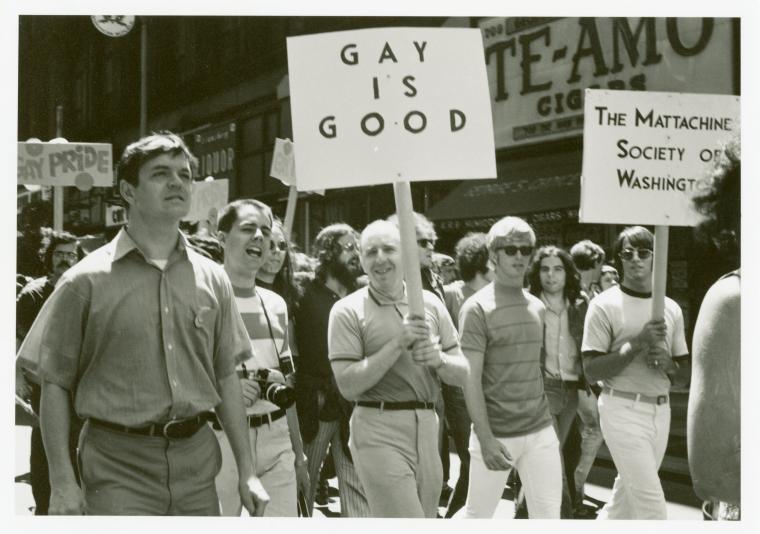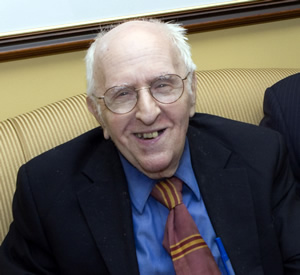
Frank Kameny, center with 'Gay is Good' sign, was one of the most visible leaders of the early gay rights movement
The Washington Blade has reported that pioneering gay rights activist Franklin E. “Frank” Kameny died today at his home at age 86, apparently of natural causes.
Kameny, born and raised in New York City served in the Army and was a World War II combat veteran. After the war, he earned a doctorate in astronomy from Harvard and went on to work as an astronomer for the U.S. Army map service but was fired in the 1950s when Army officials discovered he was gay. Kameny contested the firing in the courts, eventually becoming the first person to file a gay-related case before the U.S. Supreme Court. The Supreme Court upheld lower court rulings against Kameny by refusing to hear the case, but the case was what prompted him to become a lifelong advocate for gay rights.
Kameny and Jack Nichols cofounded the Washington, D.C. chapter of one of the earliest gay rights organizations, the Mattachine Society, in 1961. In 1963, Kameny drafted the first bill to repeal Wasington, D.C.’s sodomy law — which finally happened in 1993 — and on April 17, 1965, Kameny and Nichols led the first public gay protest, a picket outside the White House.
Kameny also led the fight to get homosexuality removed from the American Psychiatric Association’s manual of mental disoders, which happened in 1973 in a vote taken during the association’s convention in Dallas. Kameny danced with Dallas gay rights advocate Phil Johnson at a dinner during that convention.
In 1971, Kameny became the first openly gay congressional candidate when he ran in 1971 in D.C.’s first race to elect a non-voting representative to Congress, and following that race, Kameny and his campaign organization created the Gay and Lesbian Alliance of Washington, D.C., which continues to lobby Congress on LGBT issues. Also in the 1970s, he became the first openly gay person appointed to D.C.’s Human Rights Commission, and he served 20 years on the Selective Service board.
The Library of Congress acquired Kameny’s papers documenting his life in 2006 and in 2007 The Smithsonian Institution’s National Museum of American History included signs and buttons from Kamen’s 1965 protest at the White House in an exhibit called “Treasures of American History.”
In 2009, Kameny’s home in Washington, D.C. was designated as a D./C. Historic Landmark; John Berry, director of the federal government’s Office of Personnel Management apologized to Kameny on behalf of the government and presented him the department’s most prestigious award, the Theodore Roosevelt Award.
In 2010, following a unanimous vote by the Dupont Circle Advisory Neighborhood Commission, a portion of 17th Street was renamed “Frank Kameny Way,” and that same year, Kameny was presented with the Cornelius R. “Neal”Alexander Humanitarian Award.

















Please note that Frank and Jack founded the Washington CHAPTER of Mattachine. The original Mattachine Society was founded in the early 1950s in Los Angeles, as portrayed in THE TEMPERAMENTALS, currently play at Uptown Players.
Thanks Paul. Correction made
While we’re paying homage to those who made a difference – if memory serves, long before he made thousands of us laugh around the country, long before he rocked the boat in a comedy troupe called “Less Miserable,” Paul J. Williams was one of the initial members of the first gay youth group in Dallas, around 1984-85, that met in the back of our fledgling Dallas Gay Alliance Community Center nextdoor to Union Jack. I remember watching him as a core member who layed groudwork for many people in a tough era find their footing. That group, unattached to a particular school or university, was the pre-cursor to Youth First Texas. Rock, on Paul.